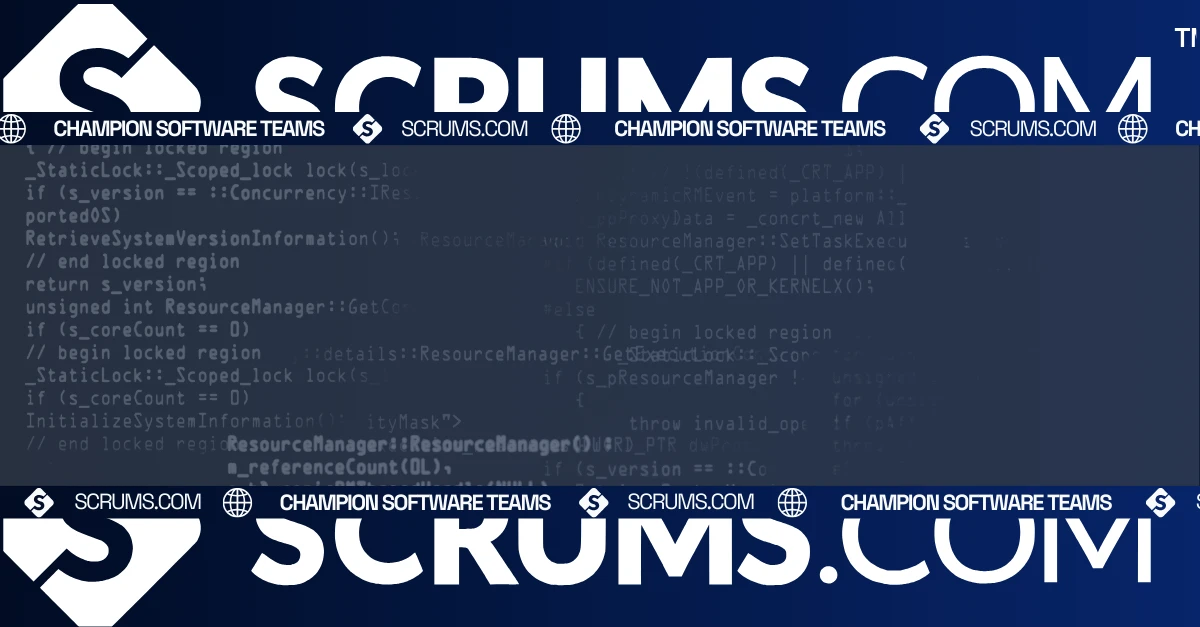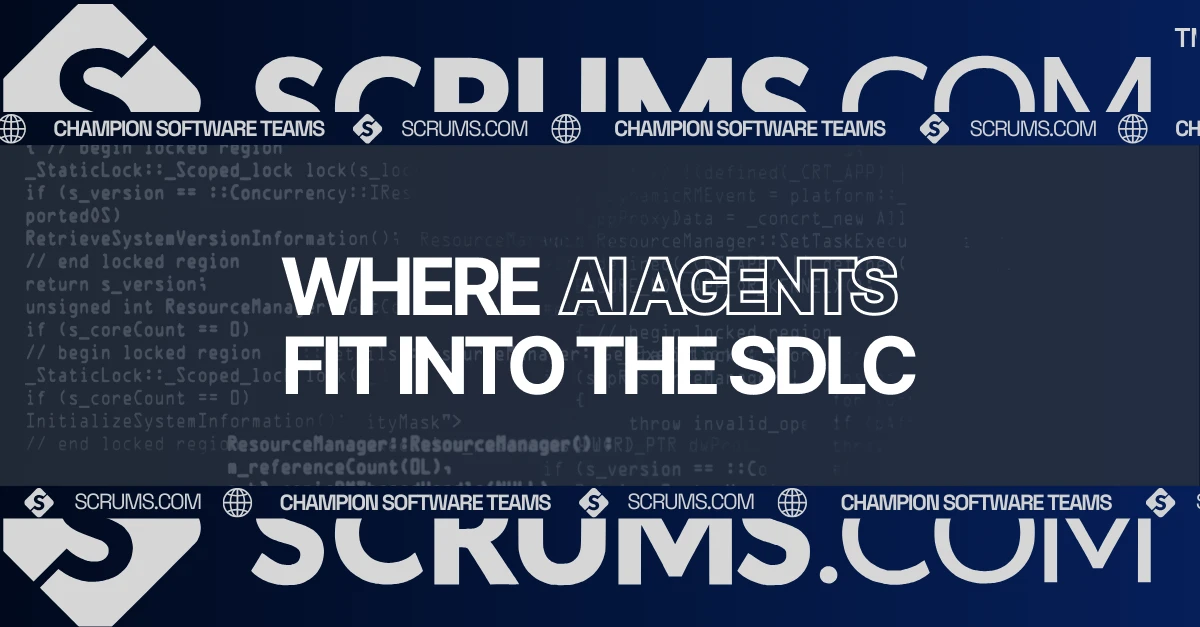Hire Kubernetes software developers
Scrums.com's 10,000+ software developer talent pool includes experts across a wide array of software development languages and technologies giving your business the ability to hire in as little as 21-days.







































Years of Service
Client Renewal Rate
Vetted Developers
Ave. Onboarding
Africa Advantage
Access world-class developers at 40-60% cost savings without compromising quality. Our 10,000+ talent pool across Africa delivers enterprise-grade engineering with timezone overlap for US, UK, and EMEA markets.
AI-Enabled Teams
Every developer works within our AI-powered SEOP ecosystem, delivering 30-40% higher velocity than traditional teams. Our AI Agent Gateway provides automated QA, code reviews, and delivery insights.
Platform-First Delivery
Get real-time development visibility into every sprint through our Software Engineering Orchestration Platform (SEOP). Track velocity, blockers, and delivery health with executive dashboards.
Align
Tell us your needs
Book a free consultation to discuss your project requirements, technical stack, and team culture.
Review
We match talent to your culture
Our team identifies pre-vetted developers who match your technical needs and team culture.
Meet
Interview your developers
Meet your matched developers through video interviews. Assess technical skills and cultural fit.
Kick-Off
Start within 21 days
Developers onboard to SEOP platform and integrate with your tools. Your first sprint begins.
Don't Just Take Our Word for It
Hear from some of our amazing customers who are building with Scrums.com Teams.
Flexible Hiring Options for Every Need
Whether you need to fill developer skill gaps, scale a full development team, or outsource delivery entirely, we have a model that fits.
Augment Your Team
Embed individual developers or small specialist teams into your existing organization. You manage the work, we provide the talent.
Dedicated Team
Get a complete, self-managed team including developers, QA, and project management – all orchestrated through our SEOP platform.
Product Development
From discovery to deployment, we build your entire product. Outcome-focused delivery with design, development, testing, and deployment included.
Access Talent Through The Scrums.com Platform
When you sign-up to Scrums.com, you gain access to our Software Engineering Orchestration Platform (SEOP), the foundation for all talent hiring services.
View developer profiles, CVs, and portfolios in real-time
Activate Staff Augmentation or Dedicated Teams directly through your workspace

Need Software Developers Fast?
Deploy vetted developers in 21 days.
Tell us your needs and we'll match you with the right talent.
What is Kubernetes and Why It Matters for Your Business
Kubernetes is an open-source platform for automating the deployment, scaling, and management of containerized applications. Originally developed by Google and now maintained by the Cloud Native Computing Foundation (CNCF), Kubernetes has become the industry standard for container orchestration. According to a 2023 CNCF survey, 66% of organizations are either using or evaluating Kubernetes in production, highlighting its critical role in modern software development.
Hiring a Kubernetes developer is essential for businesses looking to optimize their cloud-native applications, improve scalability, and enhance operational efficiency. From microservices to complex DevOps environments, Kubernetes offers the robust infrastructure needed to manage applications at scale, making it an invaluable asset for businesses embracing cloud-native solutions.
Key Benefits of Hiring a Kubernetes Developer
Hiring a Kubernetes developer offers numerous advantages, especially for businesses focused on building scalable and resilient applications. Here are some key benefits:
- Automated Deployment and Scaling: Kubernetes automates the deployment and scaling of applications, ensuring that your software runs smoothly even during peak loads. A skilled Kubernetes developer can set up automated workflows, allowing your infrastructure to scale up or down based on demand.
- Improved Resource Efficiency: Kubernetes optimizes resource utilization by running containers on the most efficient nodes, reducing costs and improving performance. This resource management capability is crucial for businesses aiming to maximize their cloud investments.
- Enhanced Application Resilience: Kubernetes provides built-in mechanisms for self-healing, such as restarting failed containers, rescheduling disrupted workloads, and rolling back updates automatically. This ensures your applications remain available and resilient, minimizing downtime.
- Simplified DevOps Workflows: Kubernetes streamlines DevOps processes by integrating with CI/CD pipelines, automating application deployments, and managing infrastructure as code. This enables development and operations teams to collaborate more effectively, speeding up the software delivery process.
- Scalability Across Multi-Cloud Environments: Kubernetes’ portability allows businesses to deploy applications across various cloud providers, including AWS, Google Cloud, and Azure, as well as on-premises environments. This flexibility enables businesses to avoid vendor lock-in and choose the best infrastructure for their needs.
Core Competencies of a Skilled Kubernetes Developer
When hiring a Kubernetes developer, it’s essential to ensure they possess the necessary skills and expertise to manage your containerized applications effectively. Key competencies include:
- Proficiency in Kubernetes Architecture: A skilled Kubernetes developer should have a deep understanding of Kubernetes architecture, including pods, services, deployments, and persistent volumes. They should be able to design and implement Kubernetes clusters that meet your specific application requirements.
- Experience with Containerization and Docker: Kubernetes developers should be proficient in working with containerization technologies like Docker. Understanding how to create, manage, and optimize containers is crucial for deploying scalable and efficient applications in Kubernetes.
- Knowledge of Cloud-Native Development: A strong background in cloud-native development is essential for Kubernetes developers. They should be familiar with microservices architecture, container orchestration, and cloud-based environments to ensure that your applications are built to take full advantage of Kubernetes’ capabilities.
- Expertise in CI/CD and DevOps Practices: Kubernetes developers should be skilled in integrating Kubernetes with CI/CD pipelines, enabling automated testing, deployment, and monitoring of applications. This expertise is critical for maintaining a fast, reliable software development lifecycle.
- Security and Compliance Awareness: Kubernetes developers must be aware of security best practices, including securing container images, managing secrets, and setting up role-based access control (RBAC). Ensuring your Kubernetes environment is secure and compliant with industry standards is crucial for protecting your applications.
How Kubernetes is Used in Modern Software Development
Kubernetes is a cornerstone of modern software development, particularly in the context of cloud-native applications and microservices. Here are some common applications of Kubernetes:
- Container Orchestration: Kubernetes automates the deployment, scaling, and management of containerized applications, ensuring that each container runs on the optimal resources. This makes it ideal for businesses that need to manage complex, multi-container applications at scale.
- Microservices Architecture: Kubernetes is often used to support microservices architecture, where applications are broken down into smaller, independent services. This approach enhances flexibility, allows for more frequent updates, and improves overall application resilience.
- DevOps and CI/CD Integration: Kubernetes streamlines DevOps workflows by integrating with popular CI/CD tools like Jenkins, GitLab, and ArgoCD. This integration allows for automated deployment, testing, and monitoring, helping development teams deliver high-quality software faster.
- Hybrid and Multi-Cloud Deployments: Kubernetes’ flexibility enables businesses to deploy applications across multiple cloud providers or in hybrid environments that combine on-premises and cloud resources. This multi-cloud approach helps companies optimize costs, improve performance, and enhance disaster recovery capabilities.
- Big Data and AI/ML Workloads: Kubernetes is increasingly being used to manage big data and AI/ML workloads, providing the scalability and resource management needed for data-intensive applications. Kubernetes helps orchestrate complex data pipelines, ensuring that data processing tasks are efficiently managed and executed.
Kubernetes vs. Other Container Orchestration Tools: When to Choose Kubernetes for Your Project
Choosing the right container orchestration tool is critical to the success of your software development project. Here’s how Kubernetes compares to other orchestration tools and when it might be the best choice:
- Industry Standard with Widespread Adoption: Kubernetes is the most widely adopted container orchestration platform, with support from all major cloud providers. Its status as the industry standard means that Kubernetes is continuously updated and backed by a vast ecosystem of tools, making it a reliable choice for businesses of all sizes.
- Scalability and Performance: Kubernetes is designed to handle complex, large-scale deployments, making it superior to simpler orchestration tools like Docker Swarm. Its ability to manage thousands of containers simultaneously makes it ideal for enterprises with demanding workloads.
- Extensive Ecosystem and Community Support: Kubernetes has a robust ecosystem with numerous plugins, tools, and extensions, such as Helm, Prometheus, and Istio, that enhance its functionality. This extensive support network ensures that Kubernetes remains at the forefront of innovation in container orchestration.
- Flexibility and Customization: Kubernetes’ open architecture allows developers to customize their deployments extensively. This flexibility sets it apart from other platforms like Amazon ECS, which are more rigid and less adaptable to complex, custom workflows.
- Security and Compliance: Kubernetes offers advanced security features, including network policies, role-based access control (RBAC), and secrets management, providing a more secure environment compared to other orchestration tools. This makes Kubernetes the preferred choice for industries with strict security and compliance requirements.
The Future of Kubernetes Development: Trends and Insights
Kubernetes is poised to remain a dominant force in software development, with several trends highlighting its ongoing importance:
- Growing Adoption of Kubernetes Operators: Operators extend Kubernetes’ capabilities by automating complex application management tasks, such as database backup and restoration. This trend is driving the adoption of Kubernetes for managing stateful applications, further expanding its use cases.
- Integration with AI and Machine Learning: Kubernetes is increasingly used to orchestrate Artificial Intelligence (AI) and machine learning workloads, providing the scalability needed for training models and processing large datasets. This trend is expected to continue as more businesses adopt AI-driven applications.
- Serverless Kubernetes with Knative: Serverless computing is becoming more popular, and Kubernetes is adapting with frameworks like Knative, which allows developers to build and run serverless functions on Kubernetes clusters. This trend offers a more flexible and cost-effective approach to application deployment.
- Enhanced Security and Compliance Tools: As Kubernetes continues to evolve, there is a growing focus on security, with new tools and practices emerging to secure Kubernetes environments. This includes better management of secrets, improved network security, and compliance-focused features.
- Expansion into Edge Computing: Kubernetes is extending its reach into edge computing, enabling businesses to deploy applications closer to the data source. This trend is particularly relevant for industries like telecommunications, IoT, and autonomous vehicles, where low latency and real-time processing are critical.
How to Hire the Right Kubernetes Developer for Your Needs
Finding the right Kubernetes developer is crucial to the success of your cloud-native and containerized application development project. Here’s how to get started:
- Define Your Project Requirements: Clearly outline your project’s scope, technical requirements, and desired features. This will help you identify developers with the right skills and experience.
- Look for Relevant Experience: Choose developers with a proven track record in Kubernetes development, particularly those who have successfully managed containerized applications and cloud-native environments. Experience with microservices, DevOps, and cloud platforms is essential.
- Evaluate Technical Skills: Ensure the developer has strong Kubernetes and containerization skills, experience with CI/CD pipelines, and proficiency in managing scalable and resilient infrastructure.
- Assess Communication and Collaboration: Effective communication is key to a successful project. Your Kubernetes developer should be able to articulate ideas clearly and collaborate effectively with your team, especially in complex DevOps environments.
- Consider Freelancers or Development Agencies: Depending on the scale of your project, you may opt to hire a freelance developer or work with a development agency specializing in Kubernetes. Each option has its advantages, so choose based on your project’s needs and budget.
Find Related Software Developer Technologies
AngularJS Developers
ASP.NET Razor developers
C# Developers
C++ developers
Dart developers
Flutter Developers
Javascript Developers
Typescript Developers
Python Developers
Rust developers
Explore Software Development Blogs
The most recent trends and insights to expand your software development knowledge.



















